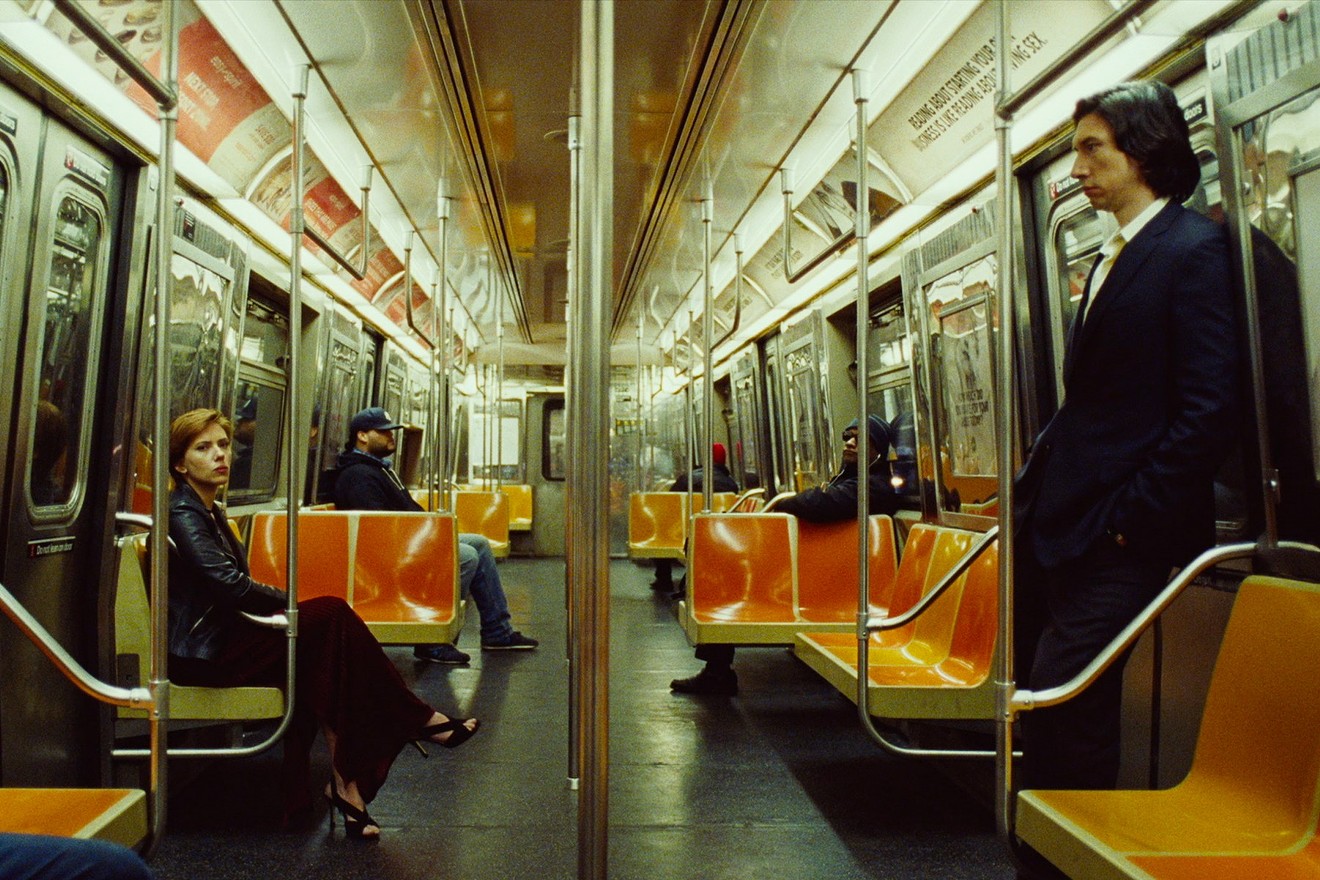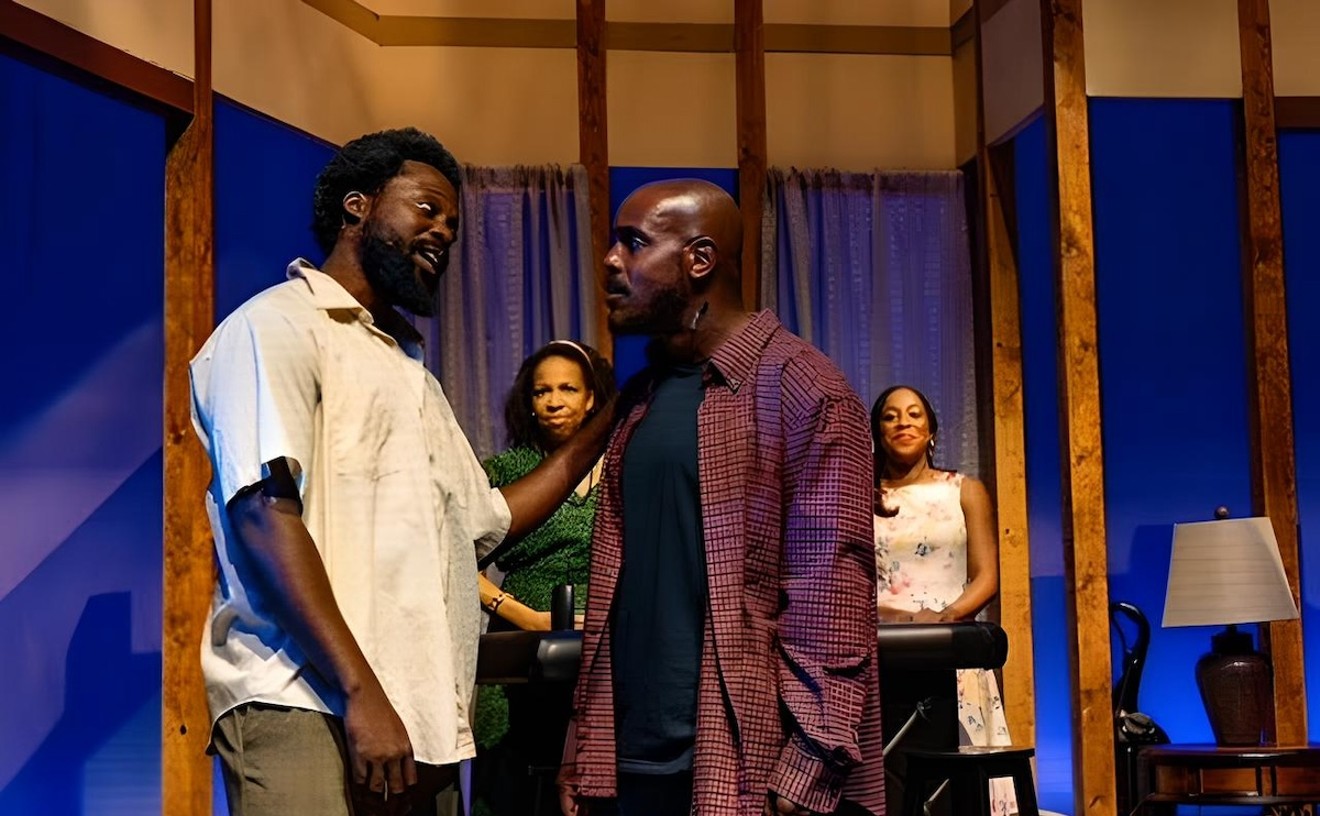Noah Baumbach's oeuvre offers a unique collection of comedies and dramas — some kind (Frances Ha, for instance) and others caustic (Margot at the Wedding and The Squid and the Whale) — that always seem concerned with dissecting its subjects as thoroughly as possible. With Marriage Story, Baumbach straddles the line between those two moods, creating a bittersweet tale about the frustration that comes with divorcing someone you've always loved.
"I always felt that the movie was essentially a love story and that love exists side-by-side in every scene," Baumbach explains to New Times by phone. "No matter how contentious things get, there's always love there. Comedy and drama both exist side-by-side as well. They're always there in our lives.
"In all my movies, I've never approached things from the perspective of Oh, I should add some comedy here because it could get too serious or This seems too goofy — I should tone it down. There's a lot of hidden genres in the film. Something like serving divorce papers is part screwball comedy, part thriller, part horror movie; it's devastating but also hilarious."
The writer/director frequently draws from experiences in his work and has crafted his own idiosyncratic approach to rendering life's joys and miseries onscreen. Though his films aren't explicitly autobiographical, many viewers will see parallels between Baumbach's divorce from Jennifer Jason Leigh and Marriage Story, in which the characters Nicole (Scarlett Johansson) and Charlie (Adam Driver) go through the motions of divorce while navigating their individual places within New York City's theater community.
"I think there's a great Philip Roth quote about how he approaches his writing: He says he takes two stones of reality and rubs them together," Baumbach says. "It's just about the imagination. I find personal filmmaking can come in all different shapes and sizes.
"There are many filmmakers we all love who maybe make genre films or things that clearly don't seem to connect to our day-to-day human existence but actually feel extremely personal and identifiable. [The films can] work as metaphor, work as whatever. And then there are other filmmakers — I suppose that I'm sort of in this world — who make things that take place in a world that's more recognizable to our lives... [and] play on recognition in a more one-to-one way."
Marriage Story, like most of Baumbach's films with expansive casts of characters, never condemns or judges its subjects for their actions. Even while spotlighting characters many observers would instinctively deride and deem unlikable, Baumbach's movies are brimming with empathy.
Discussing that quality, the filmmaker cites Jean Renoir's quote: "The awful thing about life is this: Everyone has their reasons."
He elaborates, "Even before I heard that, I think it's intuitively how I've always looked at things. Human beings are complicated, and some of my movies might press down on some characters who I find get in their own way more than anybody else's."
As the film follows Johansson's and Driver's characters, two cities become battlegrounds for their divorce. Each metropolis serves as a visual representation of and stand-in for the person it houses. For Charlie, it's New York, and for Nicole, it's Los Angeles. Baumbach says depicting the West Coast-East Coat divide helped "to dramatize the divorce in a more visual way."
"In Marriage Story, it raised the stakes of the story by having both the fact that they work together and the fact that there's two cities involved," he explains. "It's challenging the notion of home. These cities are so particular, and I know both cities and have fun with the specifics of the cities. I love shooting in both of them because they're so different and the light is so unique to each, and it provides a lot for [cinematographer] Robbie [Ryan] and me visually.
"In the divorce process, you're fighting for all these concrete things that become [poker] chips in an argument, so you start losing track of what you're actually fighting for and you witness what the system kind of distorts and perverts a lot," he adds, referencing how the characters in Marriage Story are frequently thrown apart by their collection of lawyers (played by Laura Dern, Ray Liotta, and Alan Alda), all of whom extract Nicole's and Charlie's worst tendencies throughout.
"You would hope that you could more sensibly and rationally work [disputes] out together, but I think that the cities start to represent the two people," Baumbach says. "It's nice enough in the teaser images we put out of them, and how she has L.A. reflected, but it's both true and not true because they both have to be in both places, and 'home' is going to be something different at any given time. It's what they're negotiating throughout this whole movie. They may be actually negotiating living in New York or Los Angeles, but emotionally speaking, they're negotiating a new sense and definition of what home is gonna be."
Despite inhabiting two different worlds, Marriage Story takes the time to emphasize what the two characters share and mutually loved in the past. One pair of scenes showcases Nicole and Charlie in their respective cities with their friend groups, each singing a song from Stephen Sondheim's musical Company. The juxtaposing of these songs — "You Could Drive a Person Crazy" for Nicole and "Being Alive" for Charlie — shows they're at different points in their lives but still share a love for the things that once united them.
"[The Sondheim numbers] were actually an outgrowth of the fact that I brought the actors in so early in the process," Baumbach explains. "I really wanted to know who was playing these parts before I really even wrote them, and this is our fourth movie together for Adam and I. So there are many things that we share, that we love and have talked about. There's a backlog of them, and some of them will turn up in the future and some will never be executed, but we had talked a lot about Company and how much we loved the musical. At one point we even joked, 'Could we make a movie of Company? What would that be like?'
"While discussing it, I think we talked about 'Being Alive' and that maybe there was a place for him singing that, and I kind of half-joked that I reverse-engineered this whole movie just to get him to sing that song. But it ended up being something that, as I was writing, I always had it on a notecard of 'Could this find its way in?' And this sort of goes back to the hidden genres: This movie could accept musical numbers and they could function the way they do in musicals, which is they could be both character and story."
For the filmmaker, these musical numbers became essential to the characters and their connection. "As I was following through with this character growth and story development for him, I thought that she should have a song too, and it would be ideal if they were from the same musical. If you know it, or even if you don't know it, it's clear that, in a way, they're talking to each other. There's always that love, that connection, and not everything is going to change just because the marriage is over."
Marriage Story. Opening Friday, November 29, at Tower Theater, 1508 SW Eighth St., Miami; 305-237-2463; towertheatermiami.com. Debuting on Netflix Friday, December 6.
[
{
"name": "Air - MediumRectangle - Inline Content - Mobile Display Size",
"component": "19274298",
"insertPoint": "2",
"requiredCountToDisplay": "2"
},{
"name": "Editor Picks",
"component": "17482312",
"insertPoint": "4",
"requiredCountToDisplay": "1"
},{
"name": "Inline Links",
"component": "18711090",
"insertPoint": "8th",
"startingPoint": 8,
"requiredCountToDisplay": "7",
"maxInsertions": 25
},{
"name": "Air - MediumRectangle - Combo - Inline Content",
"component": "17482310",
"insertPoint": "8th",
"startingPoint": 8,
"requiredCountToDisplay": "7",
"maxInsertions": 25
},{
"name": "Inline Links",
"component": "18711090",
"insertPoint": "8th",
"startingPoint": 12,
"requiredCountToDisplay": "11",
"maxInsertions": 25
},{
"name": "Air - Leaderboard Tower - Combo - Inline Content",
"component": "17482313",
"insertPoint": "8th",
"startingPoint": 12,
"requiredCountToDisplay": "11",
"maxInsertions": 25
}
]












